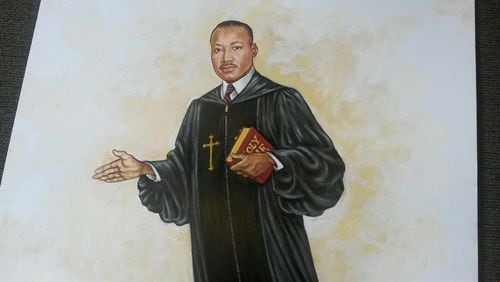Church and community leaders in Montgomery are planning to erect a statue in honor of Dr. Martin Luther King Jr. and the many foot soldiers of the civil rights movement. For more information on the Legacy Center King Statue project go to www.dexterkingmemorial.org.
Statues of Robert E. Lee and Jefferson Davis can be found in this capital city; and there’s a park downtown dedicated to Rosa Parks. A Freedom Riders museum occupies the old Greyhound bus station.
But there's no monument here for the man who led the Montgomery Bus Boycott, one of the nation's most significant protest movements.
Members of Dexter Avenue King Memorial Baptist Church — the church the Rev. Martin Luther King Jr. once pastored — want to change that. And they hope to do it by Dec. 1 of this year, the 60th anniversary of the bus boycott, which was led by King.
“Oftentimes when you are in a city and you’re involved in the movement yourself, you are a lot more modest than others,” said the Rev. Cromwell Handy, pastor of Dexter Avenue church. “Sometimes it gets by us the significance of the contributions that have been made to the world.”
Church and community leaders have a plan, a sculptor — Ronald Scott McDowell — who teaches at nearby Tuskegee University, and the support of local politicians. What's needed now is cash — $250,000 — to complete the project envisioned in 2008 by longtime Atlanta resident Evelyn G. Lowery, the late wife of the Rev. Joseph Lowery.
The statue will be placed in the courtyard of the Legacy Center, Dexter Avenue’s fellowship hall and office complex, which sits next to the Southern Poverty Law Center.
Thousands of visitors come to the tiny church every year. On some Sundays, visitors from Canada, the Netherlands and other countries outnumber the members in attendance. The church has become a popular place of worship for family reunion groups, who come by the hundreds.
‘Whole history of Alabama not being told’
A statue would be a fitting tribute to King, as well as the foot soldiers who ignited the movement, said Handy. An inscription at its base will honor the ordinary people who took part in the boycott, men and women who organized car pools and walked for miles instead of riding segregated buses.
The boycott began on Dec. 1, 1955, and lasted until Dec. 20, 1956. A federal judge in Montgomery ruled that the city’s bus segregation laws were unconstitutional. A few months later, the U.S. Supreme Court upheld that decision.
“What’s important to me is that the whole history of Alabama is not being told without that monument. You don’t have anything that points you to the leadership. We have all kinds of monuments to the Civil War leaders and we have markers around the city where different things took place, but we don’t have the level of recognition that is memorialized in the form of the statue.”
‘Evelyn was committed to that project’
Evelyn Lowery, who died at her Atlanta home in 2013, commissioned the statue in her role as chairwoman of the Southern Christian Leadership Conference (SCLC) Women.
“Evelyn was committed to that project, and I joined her in thinking it was a wonderful tribute to both Martin and the church,” said Joseph Lowery, a civil rights legend and a friend to the Kings. “I am thrilled (Pastor) Handy is moving forward.”
The artist, McDowell, said Evelyn Lowery selected him because she admired busts he sculpted of Coretta Scott King and Rosa Parks. The project is important to him because there are so many statutes of King that don’t look like the Nobel Peace Prize winner.
He plans to create a life-size bronze statue of King in his preaching robe, holding a Bible with his free hand outstretched so visitors can shake it. King’s full lips, broad nose, and almond-shaped eyes are among his most iconic features, said McDowell, who studied anthropology in college.
“He was called by God to lead the ministry and spread God’s word, but black folks called him to lead the movement,” said McDowell. “I want to portray him as God called him. After he preached he would come out and and shake everybody’s hand.”
Appreciating decades-old ‘sacrifice and efforts’
John Feagin, an artist and longtime member of Dexter Avenue, will serve as a consultant for the project. Feagin and other members have fond memories of King’s sermons, mannerisms and facial expressions. Church members have given McDowell photographs of King that have never been seen before, he said.
A mural painted by Feagin covers an entire wall in the church basement. It tells the story of the Montgomery bus boycott and contains portraits of King, Mrs. King, and civil rights icon Parks, who became a symbol of the bus boycott with her defiant decision to remain seated instead of moving to the back of the bus as instructed by the driver. Parks’ arrest sparked the movement.
As politicians, educators and community members make plans to observe the 60th anniversary of the bus boycott, Montgomery Mayor Todd Strange believes the statue effort will pick up steam.
“So many of these youngsters that are growing up today really don’t have any real appreciation for the sacrifice and the efforts that were made 50 or 60 years ago,” he said.
“A lot of people around here would say that if Rosa Parks didn’t do what she did in such a heroic fashion, you wouldn’t have had a (March on Washington).”
About the Author






